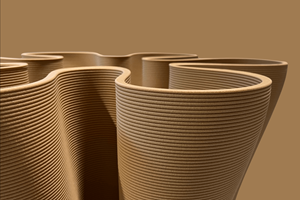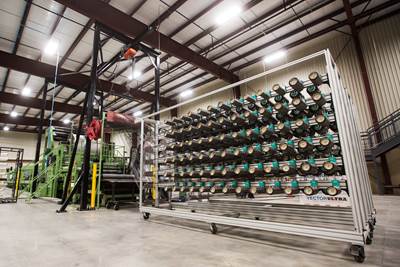Stitched, needle-punched fabrics benefit open and closed molding
CAMX 2024: Vectorply Corp. displays a range of engineered reinforcements, including NCFs, needle-punched reinforcements, consumables and more, along with highlighting it technical support options.
Share
Source | Vectorply Corp.
Vectorply Corp. (Phenix City, Ala., U.S.) enables visitors to learn how to use its combination of highly engineered reinforcements and technical support to meet composites production goals. Applying an engineering-driven product development approach, Vectorply has designed hundreds of stitched and needle-punched fabrics for open and closed mold processes of composite part production. Some of the product lines on display include:
- VectorUltra advanced reinforcements are high-performance noncrimp fabrics (NCF) made with advanced fibers such as carbon fiber, aramid and others.
- NeedlePly needle-punched reinforcements are products with no stitching, to be used for closed mold applications. Options include all-glass versions for corrosion resistance, high-loft CFM replacements, conformable heavy weight options for industrial applications and combination products with structural reinforcements layered in.
- VectorFusion infusion-specific reinforcements are designed to optimize vacuum infusion process (VIP) performance. The range of custom products use cores, substrates and veils, and can provide the ideal amount of resin necessary for the infusion process.
- VectorFusion consumables are pre-consolidated feed, branch and vacuum lines designed to optimize the infusion process by moving resin quickly to the correct areas, while also reducing the amount of resin that makes it to catch pots.
- Customized reinforcement fabrics are designed for specific applications. On display at the booth are high-temperature carbon tooling fabrics, print-blocking multilayer fabrics, light weight carbon multiaxial products for performance applications and many more.
In addition, Vectorply engineers are available on-site to explain its range of complimentary technical services and support offered to customers, whether attendees are just beginning in composites production, endeavoring to adapt a new process or optimizing products through enhanced laminate design. Visitors also have the opportunity to learn about Vectorply’s laminate analysis software, VectorLam, lab testing capabilities and on-site production support.
Related Content
-
Development of a composite liquid hydrogen tank for commercial aircraft
Netherlands consortium advances cryogenic composites testing, tank designs and manufacturing including AFP, hybrid winding, welding of tank components and integrated SHM and H2 sensors for demonstrators in 2025.
-
Sulapac introduces Sulapac Flow 1.7 to replace PLA, ABS and PP in FDM, FGF
Available as filament and granules for extrusion, new wood composite matches properties yet is compostable, eliminates microplastics and reduces carbon footprint.
-
Otto Aviation launches Phantom 3500 business jet with all-composite airframe from Leonardo
Promising 60% less fuel burn and 90% less emissions using SAF, the super-laminar flow design with windowless fuselage will be built using RTM in Florida facility with certification slated for 2030.
Related Content
Development of a composite liquid hydrogen tank for commercial aircraft
Netherlands consortium advances cryogenic composites testing, tank designs and manufacturing including AFP, hybrid winding, welding of tank components and integrated SHM and H2 sensors for demonstrators in 2025.
Read MoreSulapac introduces Sulapac Flow 1.7 to replace PLA, ABS and PP in FDM, FGF
Available as filament and granules for extrusion, new wood composite matches properties yet is compostable, eliminates microplastics and reduces carbon footprint.
Read MoreOtto Aviation launches Phantom 3500 business jet with all-composite airframe from Leonardo
Promising 60% less fuel burn and 90% less emissions using SAF, the super-laminar flow design with windowless fuselage will be built using RTM in Florida facility with certification slated for 2030.
Read MorePlant tour: Teijin Carbon America Inc., Greenwood, S.C., U.S.
In 2018, Teijin broke ground on a facility that is reportedly the largest capacity carbon fiber line currently in existence. The line has been fully functional for nearly two years and has plenty of room for expansion.
Read MoreRead Next
Optimized fiber reinforcements, fabrics, NCFs
In this Digital Demo, Vectorply provides an overview of its fiber formatting capabilities and technical support operations.
Read MoreCeramic matrix composites: Faster, cheaper, higher temperature
New players proliferate, increasing CMC materials and manufacturing capacity, novel processes and automation to meet demand for higher part volumes and performance.
Read MoreNext-gen fan blades: Hybrid twin RTM, printed sensors, laser shock disassembly
MORPHO project demonstrates blade with 20% faster RTM cure cycle, uses AI-based monitoring for improved maintenance/life cycle management and proves laser shock disassembly for recycling.
Read More






